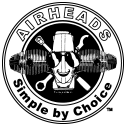Crankcase breather valve
Briefly, my engine is ‘78 R100RS updated with Nikasil jugs w/9.5 pistons. It has the ‘81 deeper oil pan and pickup. Like everyone else, I reckon, I never fill the crankcase to the MAX mark. It just disappears down to it’s “happy place”, then the usage is minimal. I typically use Spectro Golden 4 20w50.
Many years back, I replaced the spring/disk breather valve with the reed style. It seemed that the engine wanted to expel/burn more oil, and find a lower “happy place” with the reed valve. I was unhappy, and switched back to the spring/disk valve.
Just recently, I repeated history. My disk was in sorry shape, so I installed a reed valve. Now my “happy” oil level has dropped again. Reading Mr. Snowbum’s material, I found a source for a new disk. So, to complete the “repeat of history”, I plan to fix my original spring/disk valve and put it back in.
I recall a theory in my head that said, maybe cuz the opening in the reed valve is so much smaller, the velocity of the “breathing” must be much higher. Maybe that carries more oil away?
Anyone else had this experience?
Also, any associated tricks out there? I’ve considered taking a stainless steel Brillo pad and stuffing it in the breather cavity (between the valve and the hose connection) to try to catch more oil.
David,
Great minds think alike. I ride a 1995 R100RT with a stock engine. I also discovered that it would consume about 1/2 a liter of oil in 500 highway miles when starting with a full crankcase. My bike came factory equipped with the reed valve breather. I did install a stainless steel Brillo pad (two actually) in the cavity (stilling chamber in BMW lingo) downstream of the reed valve. Oil consumption stopped, except for the leaky pushrod tube seals. I still run the oil level at about the halfway mark to reduce crankcase windage.
The Brillo pads make what is commonly known as a coalescing filter, used in the pneumatic world to remove water and oil vapor from compressed air systems. It does this by providing a large surface area to condense vapor to liquid while generating very little pressure drop.
This mod should all but eliminate the oily crud buildup in the emulsion passages for the main and idle jets and low speed fuel circuits.
Andy
1995 R100RT
ABC# 15601
@murphyam53 Brilliant! I’m gonna do it when I reinstall my spring/disk breather valve. I always thought of the “old days” when the crankcase breather on your car was the mushroom canister that plugged into the valve cover. Those were always stuffed with such material. I couldn’t think of any harm in trying! Thanks! PS: Did you buy German made Brillo pads?
Nope, just the FLGS (friendly local grocery store) Brillo pad. It's more a tightly wound ball of wide but thin stainless steel coils. Tease it apart to make it more like a rope and stuff it in. I stuffed one pad in from the reed valve end and one in from the other end of the cavity.
US cars haven't had crankcase breathers like that since 1969 and the beginning of the PCV valve.
Andy
1995 R100RT
ABC# 15601
Slightly off topic, but my solution was to fit one of the deep engine sumps still offered. That adds about 1 qt to the engine oil capacity. I use that with the stock dip stick. Then when the oil level goes down it's of little or no concern since there is plenty of oil volume in reserve.
Owning an old Airhead is easy.
Keeping an old Airhead running great is the true test.
@wobbly Actually, it is quite on topic. Adding the larger sump is also part of my project. Living now in south Texas (hot!) is part of my motivation. So, in total, I’m adding the deep sump (additional quart), reinstalling the spring/disk type breather valve, and I’m gonna try the Andy Murphy Brillo pad “coalescing filter”. For $15 (eBay) I’ve got another dipstick on the way. I plan to create a new dipstick to work with the new sump. I also have to have my Reynolds stand slightly modified. I purchased the Siebenrock sump extension for this project.
@wobbly PS: oil pan gasket(s) - use no sealant or gasket dressing? Or, what do you recommend? Snowbum says no sealant. EME told me their gaskets require no sealant, yet the instructions say sealant. Brook Reams video says no sealant. Boxer2valve recommends Gasgacinch. Sheesh!
To me (and this is just me) there are 2 important things to know...
1. These days it's hard to tell where gaskets came from. I'm sure the real OEM gaskets need little help, but even a big shop might have their gaskets made locally. It's so easy now that everything like this is laser cut. Back in the day, you had to invest in a steel rule die, so making 50 gaskets was crazy expensive. Now a days, with a laser following a photograph, making 10 or 20 is child's play.
Understanding all that, I use the LocTite anaerobic "gasket makers" 510, 515, etc. There are several to choose from. a. You can apply this gel with your fingers to both sides. b. You don't need a pristine surface; it doesn't mind a little oil residue. c. It doesn't setup until the cover is tightened in place. So that completely removes the "rush" you have with YamaBond and HondaBond type sealers. d. Any excess that might squirt out can easily be wiped off... because it doesn't setup. I've been working professionally on engines since 1966 and this stuff is a God-send.
2. The oil pickup extension. If you buy a deep pan off of Ebay you rarely get the oil pickup extension. To get the most good from a deep sump, you need to be taking your oil in from the coolest part... which is at the bottom. Now, with a new unit you'll rarely need to worry about that, but I wanted to point that out for all the others.
3. Even with new parts, but especially with the OEM parts being disassembled, it's REALLY important to have flat, gasket-free surfaces. And these surfaces should be oil free by way of alcohol or other thinners. First I use a gasket scraper to get off all the old gasket. Then I use a 14" flat file to draw across the surface and remove all the metal "high spots", which includes machining marks and places that might have curled over due to past over-tightening.
4. Lastly is even tightening. Even the best gasket won't work if the cover is not evenly tightened. This is one place you really need a torque wrench ! Any over-tightening and you run the risk of not only leaks, but stripping out the engine and having to stop and get Heli-coils. Which would be a Royal PIA. So in honor of Price Phillip, let's keep the Royals out of this.
Well, I said 2 and got carried away. ?
Hope this helps.
Owning an old Airhead is easy.
Keeping an old Airhead running great is the true test.
@wobbly Richard, thanks for you advice. I am also a fan of anaerobic type sealants, especially for metal to metal. I dislike being in a hurry to put things together because clock is ticking on the sealant.
Like I mentioned, I bought the Siebenrock oil sump extension, and it comes with a 30mm pickup extension and gaskets. I agree, the pickup needs to be down where it belongs. The rather expensive large pan offered by Boxer2valve does not include a pickup extension. I liked the Siebenrock product, even though it necessitates the use of two pan gaskets. My ‘78 has the ‘81 deeper bmw pan, so once I’m put together, I should be able to easily hold 3 to 3.5 quarts (w/o filter change) and still be well below the MAX line. I like that.
Careful proper torquing will be done. Thanks!
Thought I would follow-up here, for information purposes. I have installed the Seibenrock 30mm oil sump extension. To facilitate this, I had to lower the cross brace on my Reynolds center stand by 1/2”. My bike already had the ‘81 oil pan. I purchased the matching ‘81 cast oil pickup. The Seinbenrock kit includes a 30mm oil pickup extension with gaskets and bolts/washers. I had to purchase 2 oil pan gaskets.
The quality of the Siebenrock kit is very good with nice fasteners. A little was “lost in the translation” with the instruction sheet, but it’s very straight forward.
The result; Prior to the modification, I would fill the crankcase with 2 qts (or liters) of oil, which measured approx 10mm below the MAX line on my ‘78 dipstick. After the modification, I can fill with 3 qts, and that comes to approx 16mm below the MAX line. So, the kit adds approx 1.25 qt capacity. I’m gonna stop at 1 qt additional, and leave to rest for extra air volume.
To complete the project, I used a second dipstick to make an extended dipstick for the new sump. I was able to file new marks at 3, 2.5, 2, and 1.5 qts.
Next will be my breather changes.
Thanks for the follow-up.
Owning an old Airhead is easy.
Keeping an old Airhead running great is the true test.
Reading this thread, I like the idea of a deeper oil pan, and installed them on several prior Airheads. But the cheap side of me is gonna stay with my 95 R100RT's stock pan, which is larger than older Airheads anyway. I'm also concerned about ground clearance on gravel roads (and occasional creek beds) here in rural KY. Though I did install a dipstick with thermometer bc I like monitoring such things.
I like the idea of steel mesh in the breather. But wonder if resultant air flow restriction, albeit slight, increases pulsating air pressure / vacuum sufficient to contribute to seepage from areas such as pushrod tube seals. At 44,000 miles, mine are still dry so don't wanna mess with success. But I like the idea of increasing the sweet spot. As mentioned above, when filled to the full mark, mine pukes oil into the carbs till oil level drops about midway between Full and Add. The mist also finds its way into the air filter box, and seeps out of, what appears to be, a drain hole in the rear, and seeps down the transmission case backside.
In the R100/7 I had for 11 years and 140,000 miles back in the day, I removed the breather hoses to the carb intakes, and ran an external hose, from the valve rearward and downward to the open atmosphere. I have considered doing same with this 95 RT, but would add a catch filter on the end. Then again, there's slight vacuum in the carb intake tube, so relocating the hose to open atmosphere also disturbs factory engineered crankcase ventilation; not sure if that's a good, or bad thing.
Posted by: @joe-hallReading this thread, I like the idea of a deeper oil pan, and installed them on several prior Airheads. But the cheap side of me is gonna stay with my 95 R100RT's stock pan, which is larger than older Airheads anyway. I'm also concerned about ground clearance on gravel roads (and occasional creek beds) here in rural KY. Though I did install a dipstick with thermometer bc I like monitoring such things.
In the R100/7 I had for 11 years and 140,000 miles back in the day, I removed the breather hoses to the carb intakes, and ran an external hose, from the valve rearward and downward to the open atmosphere. I have considered doing same with this 95 RT, but would add a catch filter on the end. Then again, there's slight vacuum in the carb intake tube, so relocating the hose to open atmosphere also disturbs factory engineered crankcase ventilation; not sure if that's a good, or bad thing.
So in the first paragraph you are discussing what is clearly off-road riding, complete with stream crossings.
If you do the breather re-route as discussed in the second, then there's the very real possibility the engine will ingest water and/or dust. Yes, it's called a "one-way" breather, but it's simply a name. The seal is not absolute. Some minor amount of air goes back into the engine at some RPM levels. This is why the stock hoses are routed as they are... into the pre-filtered air space, between the carb and air filter.
Owning an old Airhead is easy.
Keeping an old Airhead running great is the true test.
Fellas,
Thanks for sharing your experiences here.
Not familiar with the Brillo modification. Am I to understand this simply involves removing the cover to the breather valve and inserting the pad as an additional filter to keep oil out of the R carb? Think I get the gist but would like to hear specifics before shoving a Brillo pad in there.
ALSO ON THE BREATHER-I'm fighting some serious gobbling and noise. Here is what I've done to date
75 90s
-New updated rear main seal (last year)
-New reed type breather (last year)
-Fresh heads from Ted Porter (last month)
-Fresh nikasil lined bores, via Ted Porter (last month)
When I installed the updated reed type last year, the noise actually got worse. It's to the point now where not only does it gobble loudly at idle but also sighs like a hoot owl when I shut the bike off.
It does not make the bike un rideable but...the sitting idle seems to suffer a bit from this and it's really annoying, especially when I pull up somewhere and the bike hoots from the breather when I shut it off.
Here is what I am thinking of doing---in order--to try and stop this. One step at a time, each one more involved.
1) remove the reed type and drill a hole in the solid disk to try to elevate the pressure and suction at the reed
2) bit the bullet and go to the larger oil pan, pick up and change the center stand
3) Check the RMS-Now, it's not leaking, at all. No oil on the shelf and clutch is solid. I can't imagine the RMS is contributing to this unless I saw signs it was, in fact, leaking.
Look forward to any comment and insight you may have.
I can't talk to the Brillo. No experience in that area.
However, I'm all in for...
- Making sure the tiny drain hole is open in the "recovery well"
- The later style breather valve
- Sealing the 2 breather covers
- Deeper engine oil sumps
I also know my oil level went down as reported on short 20 mile trips, whereas it never budged on 300 mile trips.
Owning an old Airhead is easy.
Keeping an old Airhead running great is the true test.
- 27 Forums
- 1,952 Topics
- 11.1 K Posts
- 7 Online
- 11.9 K Members





